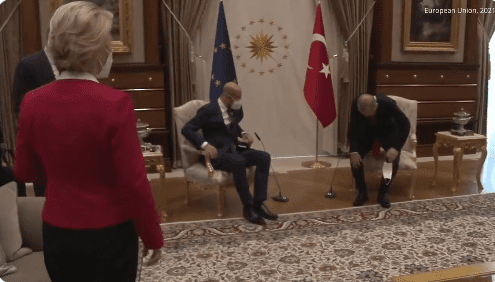By Robert Ellis, Ahval
In early April, European Council President Charles Michel and European Commission President Ursula von der Leyen paid a well-intentioned visit to Ankara to give EU-Turkey relations new momentum. But in what is now known as ‘Sofagate’ the visit fell flat.
Remarkably, in the ensuing press conference von der Leyen stated that they were very clear in their meeting with Turkish President Recep Tayyip Erdoğan: Human rights issues are non-negotiable. She mentioned the rulings of the European Court of Human Rights to release Kurdish leader Selahattin Demirtaş and philanthropist Osman Kavala, which Turkey has ignored. In effect, von der Leyen has nailed the EU’s colours to the mast, which now puts the bloc in a dilemma.
Despite the efforts of French President Emmanuel Macron to promote an assertive EU foreign policy, it has been German Chancellor Angela Merkel who has called the shots. In an outburst of altruism in August 2015, she flung open the doors of Europe to the huddled masses of the Middle East with the declaration: “Wir schaffen das” (Yes, we can do it).
When the disastrous magnitude of the decision dawned on her, Merkel rushed off to Istanbul in October to meet with Erdoğan in search of a remedy. She brought with her an offer of financial support for Syrian refugees in Turkey, the prospect of visa-free travel for Turkish citizens, and a revival of Turkey’s EU accession process in return for help to stem the influx.
The deal was finally cemented in a statement the following March, which included 6 billion euros in refugee support, visa liberalisation, a commitment to reenergise the accession process, and an upgrade of the customs union. As Erdogan’s late advisor Burhan Kuzu tweeted: “The EU finally got Turkey’s message and opened its purse strings. What did we say? ‘We’ll open our borders and unleash all the Syrian refugees on you.’”
Erdoğan has regularly reminded the EU of its commitments, for example, in a Christmas message to Merkel and a New Year message to von der Leyen, and declared Turkey’s intention to “turn a new page” in its relations with Europe, putting the EU in a bind.
Last year, in an interview with the Financial Times, Macron put it bluntly: “We are at a moment of truth, which is to decide whether the European Union is a political project or just a market project.” This is where EU-Turkey relations currently are.
The EU defined its criteria for membership in Copenhagen in 1993: Stability of institutions guaranteeing democracy, the rule of law, human rights, respect for and protection of minorities, and a functioning market economy. Turkey achieved candidate status in 1999, and accession talks began in 2005 but can now be said to have failed on almost all counts.
Last week, the European Parliament approved its 2019-2020 report on Turkey which, according to rapporteur Nacho Sánchez Amor, was the most critical in recent years. It reflects what has been the worst period of relations between Turkey and the European Union and reiterates a call for accession negotiations to be formally suspended if the current trend is not reversed.
Against this firm stand is Merkel’s call for “a constructive dialogue” and “a positive agenda”. Consequently, when it comes to applying sanctions on Turkey for its aggressive policy in the eastern Mediterranean towards member states Greece and Cyprus, the EU has dithered and kicked the can down the road.
As the European Council concluded in December: “The EU will seek to coordinate on matters relating to Turkey and the situation in the eastern Mediterranean with the United States.” At the same time, it insisted that the EU, its member states and institutions were all committed to promoting and respecting the values on which the union is founded, including the rule of law.
However, as the European Parliament notes in its report, EU-Turkey relations have become progressively more transactional, no doubt with reference to the importance of trade relations and the EU’s considerable investment in Turkey. The report also stresses that a purely transactional relationship will hardly contribute to Turkey advancing towards a more democratic model.
In March, the European Council said the bloc was ready to engage with Turkey “in a phased, proportionate and reversible manner” to enhance cooperation in a number of areas of common interest, for example, a modernisation of the customs union, but would take further decisions in June.
The European Parliament has also expressed its full support for the pro-democracy efforts of Turkey’s civil society. In this context, the German Marshall Fund has published a public opinion survey, “Turkish Perceptions of the European Union”, which confirms the younger generation (from 18 to 24) in particular view the EU positively. For example, there is greater trust in the European Court of Human Rights, the International Court of Justice, and the EU than in the Organisation of Islamic Cooperation.
Reflecting on the European Parliament’s report, Amor also had a message for the European Council and the European Commission: “We need to unify our policies for Turkey. Turkey could not be offered a positive agenda without talking about democratic reforms. When any agreement with Turkey comes, such as the customs union, the European Parliament will ultimately judge any agreement regarding its contribution to bring more democracy to Turkish civil society.”
In view of the cold shoulder they received in Ankara, Michel and von der Leyen should bear this in mind at the EU summit in June.





